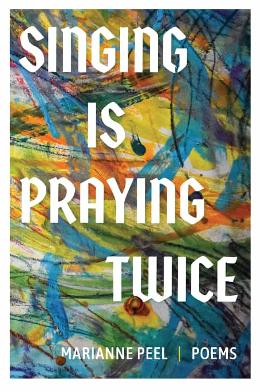Book Review
In what we once called the deep structure of language lives the dark side of beauty, a subtext fraught with the lingering doubt and fear of what we suspect as a child is the true nature of existence, only to realize, as an adult, that our suspicions were correct.
This is the thread that binds the wildly divergent poems of Marianne Peel’s Singing Is Praying Twice to a narrative structure in search of meaning. What at first appears coincidental is darkly calculated by a force that demands genuflection but is met, in Peel’s world, with recognition and resistance.
From “No Exception to the Rules,” when the narrator’s overbearing father (who banned books in the house when she turned fourteen) demands her shoes shined and her bed made to military standards, her skirt “regulation length/lower than her fingertips,” we find her rolling her skirt on the bus to school, “revealing fresh scabs and scarred playground knees/that take her everywhere/she isn’t supposed to go.”
“Forever startled and amazed,” (“I Begged My Mother For A Doll”), Peel confronts the reality of her existence with subversion, “faithful flagellation” as she tells us in “Ceremony,” a secret resistance to the disappointment and violence she recognizes in the world from an early age, whether that comes in the form of her parents’ strained marriage, her own struggle to raise daughters she hopes will be willing to abandon “the shoreline in search of deeper water” (“This is Your Water Waltz”), or the realization that no resolution comes from even the passing of time.
As she says of her aging father in “Forgive Me, I Won’t Call on Sunday’s Anymore,” when he no longer recognizes her voice:
I regret dialing.
Regret giving you
the opportunity
to not know
who
I am.
The paradox remains, and yet there is a deeper understanding that comes in the form of acceptance. As Peel tells us in “Mapping Our Universe:”
I don’t want to escape the brown spots
emerging on my hands. . . .
I want my granddaughter,
the one who carries my name,
to connect these dots, these liver spots,
with a bright purple magic marker. . . .
into startling galaxies she creates. . . .
we carry each other home.”
Her resistance and understanding manifest as joy in the moments life offers that give our suffering meaning, our existence purpose and, above all else, our lives hope.

James Alan Riley is the author of the poetry collections Uncertain Mythologies (Shadelandhouse Modern Press, 2024) and Broken Frequencies (Shadelandhouse Modern Press, 2019). He is the recipient of the 2020 Thomas and Lillie D. Chaffin Award for Excellence in Appalachian Literature, a National Endowment for the Arts Fellowship, and a number of Fellowships from the Kentucky and Ohio Arts Council. He is Professor Emeritus of English at the University of Pikeville and lives in Pikeville, Kentucky with his wife Tammy and their grandson Kaden.
Read all of Still: The Journal's past reviews

